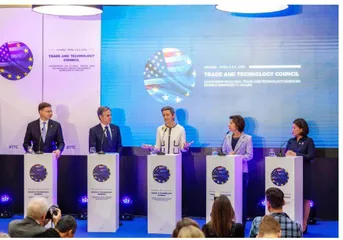European Economic Security Strategy and Its Impact
作者: Ding Chun

The EU has long been seen as a major force for multilateralism and free trade due to its open and liberal economic policies and single market. However, that changed in June 2023 when the European Commission unveiled the European Economic Security Strategy for the first time. This strategy identified economic risks to the EU, and proposed solutions and action plans to address these risks, reflecting the EU’s new understanding and thinking on economic security. In January 2024, the Commission took a step further by publishing its economic security package which introduced five new initiatives with the aim to strengthen economic security. The strategy shows EU’s changing view on the global political and economic landscape, and has important ramifications for the European Union, its external relations, and global economic dynamics.
Background
The economic security strategy begins with the economic security situation facing the EU, highlighting three challenges, namely the COVID-19 pandemic, the Ukraine crisis, and growing geopolitical tensions, and lays out pathways to address the new risks. The Joint Communication on a European Economic Security Strategy published by the European Commission and European Union High Representative Josep Borrell underscores the importance of minimizing risks in the context of increased geopolitical tensions and accelerated technological shifts. The economic security strategy shows the EU’s reflections on economic dependence as well as its concerns about the geopolitical situation.
I. Economic Concerns
The immediate reason for releasing the economic security strategy is concerns over economic dependence. A shortage of strategic products and disruption of the supply chain during the COVID-19 pandemic forced the EU to assess its economic dependence. The EU Industrial Strategy updated in 2021 identified 137 products which the EU was highly dependent on foreign sources. The Ukraine crisis further heightened its concerns. On the one hand, the EU is highly dependent on Russian energy resources. The European Commission had to take measures to ensure energy security just a month after the outbreak of the crisis. Dependence on a single non-EU country for critical raw materials is even more alarming. That is why the Critical Raw Materials Act has been adopted. On the other hand, being increasingly worried about economic dependence being weaponized in the context of the COVID-19 pandemic and the Ukraine crisis, the European Commission proposed to create an anti-coercion tool in 2020 and later adopted the Anti-Coercion Instrument.
Since 2016, the EU has been deeply concerned about its relative decline in strength. On economy and trade, its Open Strategic Autonomy ensures the capacity to make autonomous economic and trade policy while acknowledging economic interdependence. On emerging technologies, the EU is aware that it is lagging behind China and the United States. Traces of its anxiety and sense of insecurity can be found in the European Chips Act. All-round economic anxiety is the root cause of the economic security strategy that goes beyond the EU’s traditional policy framework. However, European integration based on the single market and free movement of factors keeps the EU from sliding further towards unilateralism. That is why the Union remains quite cautious, stressing “resilience”, “cooperation” and “open strategic autonomy” in an attempt to strike a balance between efficiency and security.
II. Geopolitical Considerations
Within the EU, economic security has increasingly become an important issue in the political agenda of major European countries. France has been championing “economic sovereignty” and “technological sovereignty”, opposing long-arm jurisdiction, and promoting EU strategic autonomy. Germany has adopted its National Security Strategy for the first time, putting forward the concept of integrated security and taking a resilient and competitive economy as the pillar for security. Following the footsteps of France and Germany, the EU launched its economic security strategy as a response to the calls of member states. The strategy can close the potential loophole resulting from a policy mismatch among member states, and give the EU a greater say in economic policy making. It can also be seen as a continuation of EU’s transition to a geo-political group which started when President von der Leyen proposed a geopolitical commission soon after taking office.
Externally, the turbulent geopolitical landscape and volatile world economy have made economic security issues more acute. Firstly, the EU has to reflect upon its economic dependence in the context of the ongoing Ukraine crisis. Secondly, the union has been deeply troubled by U.S. unilateralism which has not gone away despite a change of government. An example is the Inflation Reduction Act which aims to attract European companies with subsidies. Worse still, the possible comeback of Donald Trump may bring new frictions over the tariff. Thirdly, the EU faces intense competition from China which has been viewed as an economic competitor and a systemic rival since 2019. The dependence on the Chinese economy is often mentioned in the same breath as dependence on Russia. Finally, the securitization of economic issues is partly driven by America’s economic containment policy against China. The United States has been pressuring its allies to decouple from China economically and technologically. Faced with security “threats” concerning trade, investment, technology, raw materials, among other things, the EU finds it necessary to unveil a comprehensive economic security strategy in addition to the existing policy tools such as the framework for foreign direct investment review and the Digital Markets Act.